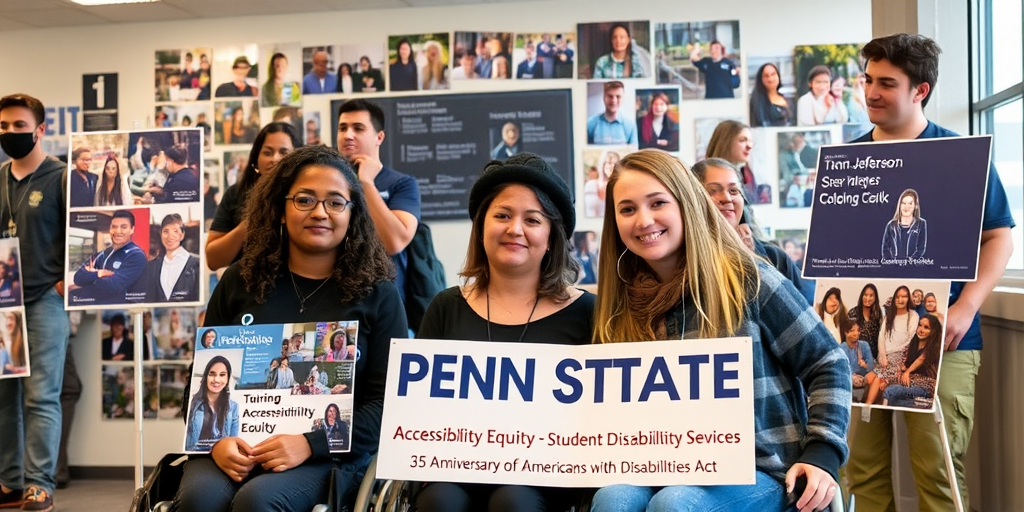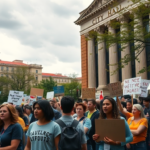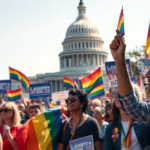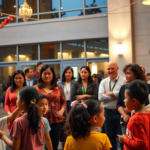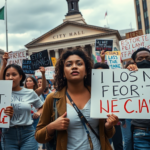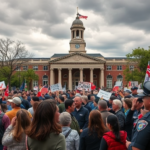World Campus Students Lead the Charge for Accessibility Equity
In a remarkable display of advocacy and leadership, two Penn State World Campus students, Tanja Jefferson and Lauren Shevchek, are turning their personal experiences with disabilities into powerful action for change. By championing accessibility equity, the duo aims to enhance representation and leadership opportunities for students with disabilities at the university, thus impacting the local community profoundly.
Advocacy and Action
Jefferson and Shevchek are not just learners balancing their academic pursuits; they are catalysts for change within the Penn State World Campus. Living with a dynamic invisible disability, Jefferson has spearheaded efforts to form a special committee under the Penn State World Campus Student Government Association (WCSGA). This committee focuses explicitly on improving online experiences and representation for students with disabilities.
“Good advocacy includes action,” Jefferson stated. “It’s not just the next logical step in the process of creating effective change, but entirely necessary.”
Shevchek, who rejoined the university in 2021 after a paralyzing diving accident, echoes this sentiment with her advocacy work, which promotes altering perceptions about disability. She emphasizes the power of collective voices in driving impactful change. Together, they represent a growing movement within the WCSGA aiming for continuous representation and advocacy on behalf of students with disabilities.
Impacting the Penn State Community
The ramifications of Jefferson and Shevchek’s work extend beyond individual advocacy. Their efforts helped launch the Disability and Neurodivergence Affinity Group, which debuted with 55 members, creating an essential community for students navigating similar experiences. This initiative supports students in sharing their journeys and finding camaraderie in a shared experience.
Jefferson emphasizes the importance of community in effecting change, stating, “Creating the standing committee for disability advocacy will ensure it’s a position and focus that remains consistently represented in WCSGA affairs and the World Campus community as a whole.”
Moreover, their co-leadership in the 35th anniversary celebration of the Americans with Disabilities Act has brought further attention to the significance of their mission. Through events like a four-hour livestream featuring personal stories and discussions, Jefferson and Shevchek foster an environment for education and awareness that has been praised by figures like Terry Watson from the World Campus Student Disability Services.
“You can’t have meaningful conversations about disability without including the voices of those who live it,” said Watson. “What Tanja and Lauren are doing is giving voice to a population that’s often overlooked, creating space for real dialogue and leadership.”
Continued Efforts and Future Implications
As Jefferson and Shevchek continue to drive their initiatives, the broader Penn State and local communities stand to benefit significantly. Their efforts in conducting student surveys regarding connection to Student Disability Services will provide vital data that informs future advocacy and policy adjustments to better serve students with disabilities.
This advocacy sets a precedent not only for ongoing initiatives within Penn State but potentially for other educational institutions recognizing the importance of accessibility equity. By modeling effective community organization and leading by example, Jefferson and Shevchek are paving the way for future leaders to carry the torch of inclusivity.
While challenges remain, such as ensuring sustainable funding and continued representation within student governance, the potential for improved policies and increased awareness is vast. For students contemplating advocacy engagement, Jefferson and Shevchek’s work demonstrates that meaningful change is within reach.
Balanced Perspectives and Resources
Despite overwhelming community support, some critics might argue about the allocation of university resources. Balancing budget priorities while maintaining a focus on student services is a delicate task. Nonetheless, advocates highlight the long-term benefits of empowering all students, arguing that broader participation in university life enriches the educational experience for everyone involved.
For those interested in these developments, resources and contact information are available through Penn State World Campus’s Student Disability Services. Their commitment to support and accessibility underscores the university’s dedication to diversity and inclusion, ensuring all voices are heard and valued.
In summary, the advocacy work of Tanja Jefferson and Lauren Shevchek represents more than just a local impact at Penn State World Campus. It illuminates a path toward inclusive educational environments nationwide, driven by unwavering commitment and resonating with the fundamental values of equity and representation.
For more information about accessibility support, visit the Penn State World Campus [Student Disability Services](https://student.worldcampus.psu.edu/inclusion-and-wellness/disabilities-and-accommodations). To learn more about their initiatives, engage with upcoming events, or participate in surveys, residents can contact mdawson@psu.edu or reach out to the hotline at 814-865-5818.

